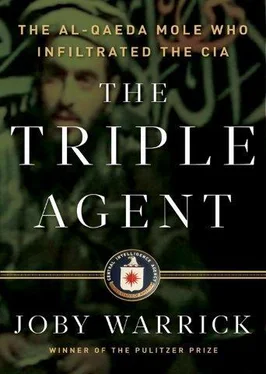When the debriefing was over, a medical officer would check Balawi’s vitals, and a technical team would outfit him for the dangerous mission to come. Then everyone could relax, have a bite to eat, perhaps even a drink.
And there would be a surprise, a birthday cake.
The Jordanian had just turned thirty-two on Christmas Day, a trivia plum that Matthews had been pleased to discover. In fact his special birth date had very nearly caused him to be named Isa—Jesus, in Arabic—before his parents changed their minds and decided instead on Humam, meaning “brave one.” And now this same Humam was speeding toward Khost with what could well be the agency’s greatest Christmas present in many a season, an intelligence windfall so spectacular that the president of the United States had been briefed in advance.
As she waited for the Jordanian, Matthews’s head swirled with questions. Who was this man? How did anyone get close to Zawahiri, one of the most reclusive and carefully protected humans on the planet? So much about the Balawi case was confusing. But Matthews had her orders, and she would not fail or flinch.
Balawi would be given a fitting reception. There were no birthday candles at the CIA’s forward base in violent eastern Afghanistan. But the Jordanian would have his cake.
That is, if he ever showed up.
By 3:30 P.M. the entire team was ready and waiting outside the interrogation building. Another thirty minutes dragged by without news from the Jordanian, and then an hour, and now the sun was slumping toward the tops of the mountain peaks west of Khost. The temperature dropped, and the nervous adrenaline congealed into plain nervousness.
Had something happened? Had Balawi changed his mind? There were no answers and nothing to do but wait.
The group of men and women beneath the metal awning had grown to fourteen, an oddly large gathering for an informant meeting. Normally, the imperative to shield a spy’s identity dictates that no more than two or three officers are ever allowed to see him. But as was quickly becoming clear, there was nothing normal about the Balawi case. There was a sense of destiny, of history being made, one CIA participant in the events later recalled. “Everyone,” the officer said, “wanted to be involved in this one.”
Gradually the officers segregated themselves into small groups. The security detail, two CIA employees, and a pair of guards working for the private contractor Xe Services LLC, commonly known as Blackwater, stood near the gate, talking in low voices, M4s slung over their backs. Three of the men were military veterans, and all four had become chummy. Pipe-smoking Dane Paresi, a former Green Beret and one of the oldest in the group at forty-six, had joined Blackwater after a career that included stints in multiple hellholes, most recently Afghanistan, where his conduct under fire had earned him the Bronze Star. Iraq veteran Jeremy Wise, thirty-five, an ex-Navy SEAL with an infectious grin, had signed up with the security contractor to pay the bills after leaving active service and was struggling to figure out what to do with his life. Security team leader Harold E. Brown Jr., thirty-seven, was a former army intelligence officer and devoted family man who taught Roman Catholic catechism classes and led Cub Scouts back in Virginia. Scott Roberson, thirty-eight, had been a narcotics detective in Atlanta in a previous life, and he was looking forward to becoming a father in less than a month.
Nearer to the building, two men in civilian jeans and khakis chatted with the ease of longtime friends. Both were guests at Khost, having flown to Afghanistan from Jordan to be present at Balawi’s debriefing. The big man with ink black hair was Jordanian intelligence captain Ali bin Zeid, a cousin of King Abdullah II of Jordan and the only one in the group who had ever met Balawi. Darren LaBonte, an athletic ex–Army Ranger who sported a goatee and a baseball hat, was a CIA officer assigned to the agency’s Amman station. The two were close friends who often worked cases together and sometimes vacationed together along with their wives. Both had been anxious about the meeting with Balawi, and they had spent part of the previous day blowing off steam by snapping pictures and puttering around on a three-wheeler they had found.
A larger group clustered around Matthews. One of them, a striking blonde with cobalt blue eyes, had been summoned from the CIA’s Kabul station for the meeting because of her exceptional skills. Elizabeth Hanson was one of the agency’s most celebrated targeters, an expert at finding terrorist commanders in their hiding places and tracking them until one of the CIA’s hit teams could move into place. She was thirty but looked even younger, bundled up inside a jacket and oversize flannel shirt against the December chill.
The wind was picking up, and the late-afternoon shadows stretched like vines across the asphalt. A frustrated boredom set in, and officers fidgeted with their cell phones.
Paresi set down his weapon and tapped out an e-mail to his wife. Mindy Lou Paresi was airborne at that moment, flying back to Seattle from Ohio with the couple’s youngest daughter after holiday visits with family. As he often did, Paresi would leave a message that his wife would see when she landed, just letting her know that he was OK.
“E-mail me when you get to the house,” he wrote. “I love you both very much.”
Jeremy Wise stepped away from the others to make his phone call. The Arkansas native was feeling strangely anxious, so much so that he wondered if he was coming down with something. He dialed his home number, and when the answering machine picked up, the disappointment clearly registered in his voice. “I’m not doing very well,” he said, speaking slowly. He hesitated. “Tell Ethan I love him.”
Bin Zeid was the only one with a direct line to Balawi, and his phone had been distressingly silent. The big man now sat quietly, clutching his mobile between thick fingers. It was bin Zeid who had gone over the arrangements with the agent—Balawi had been his recruit after all—and now the possibility of failure loomed over him like a leaden cloud. On top of it all, both he and his CIA partner, LaBonte, had personal reasons for wanting out of Afghanistan in a hurry. LaBonte’s entire family, including his wife and their baby daughter, was waiting for him in an Italian villa they had rented for the holidays, and the delays had already eaten up most of his vacation. Bin Zeid, who was newly married, had made plans to spend New Year’s Eve with his wife back in Amman.
When his phone finally chirped, it was a text message from dark-haired Fida, asking her husband if he was positive he would be home the following evening. Bin Zeid tapped out a terse reply. “Not yet,” he wrote.
Just after 4:40 P.M. bin Zeid’s phone finally rang. The number in the caller ID belonged to Arghawan, the Afghan driver who had been dispatched to the border crossing for the pickup. But the voice was Balawi’s.
The agent apologized. He had injured his leg in an accident and had been delayed, he said. Balawi had been anxious about his first meeting with Americans, and he asked again about the procedures at the gate. I don’t want to be manhandled , he kept repeating.
You’ll treat me like a friend, right? he asked.
By now a column of dust from Afghawan’s red Outback was already visible from the guard tower. The driver was moving fast to thwart any sniper who might happen to have a scope trained on the road in time to see an unescorted civilian vehicle heading for the American base. In keeping with the CIA’s instructions and, coincidentally, with Balawi’s wishes, there would be no fumbling or checking IDs at the gate. On cue, the Afghan army guards at the front gate rolled back the barriers just enough to let Arghawan roar past. The Afghan driver then veered sharply to the left and followed a ribbon of asphalt along the edge of the airfield to a small second gate, where he was again waved through.
Читать дальше












